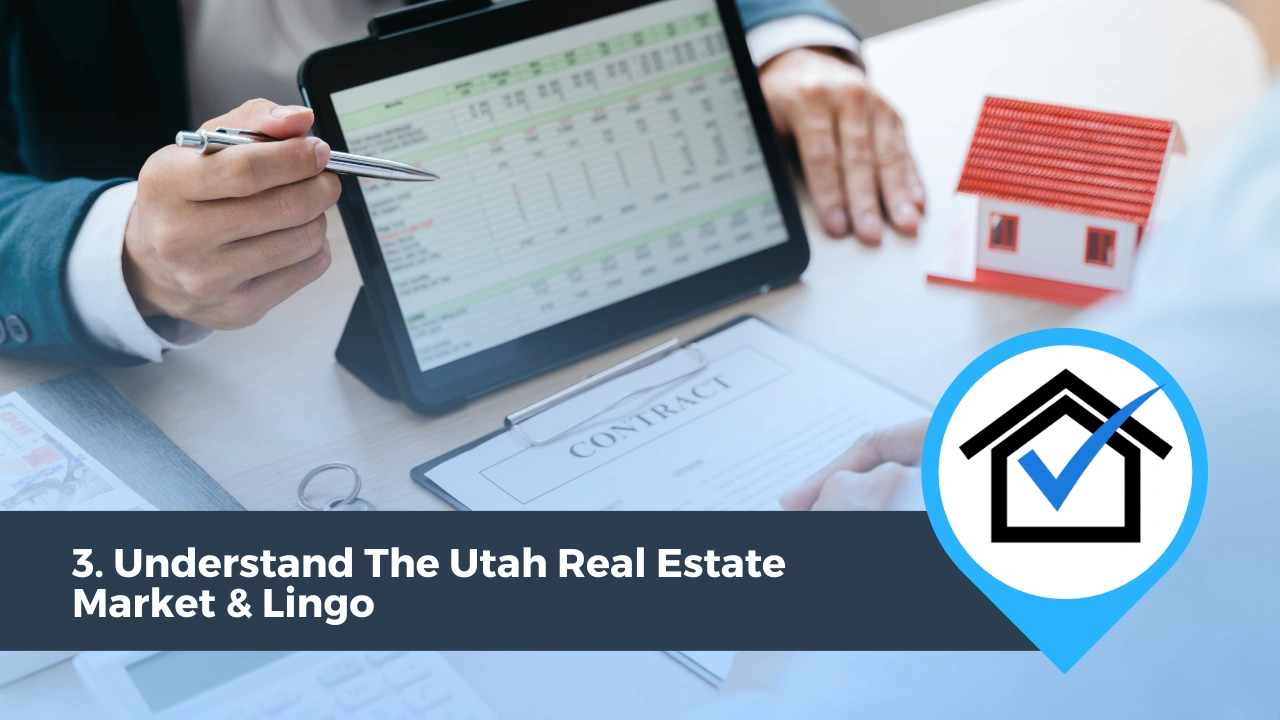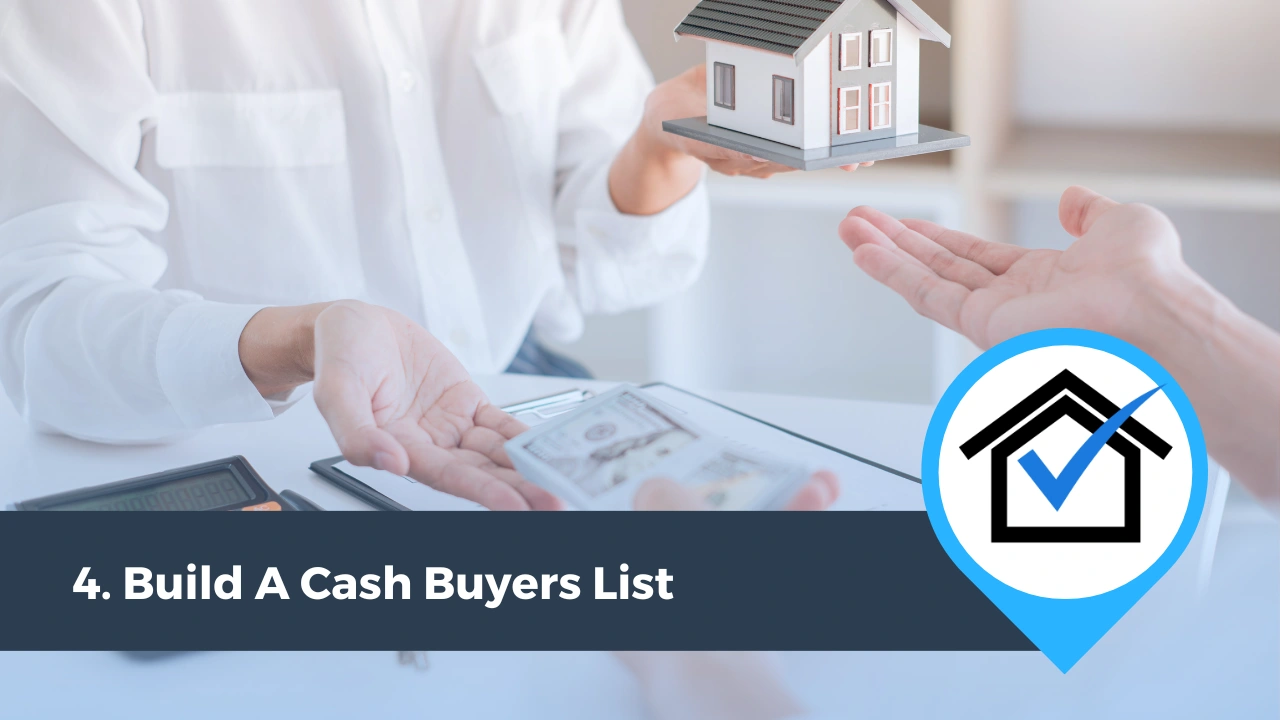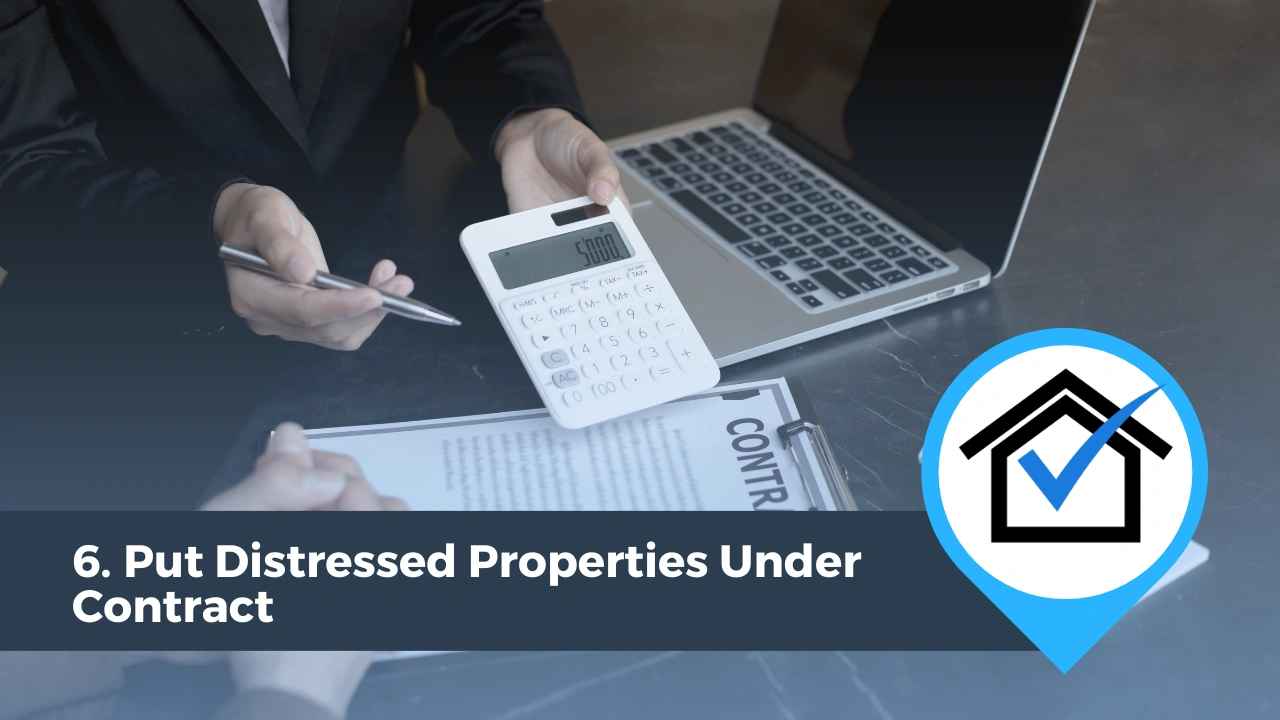How To Wholesale Real Estate In Utah: Step-By-Step (2026)
Dec 01, 2025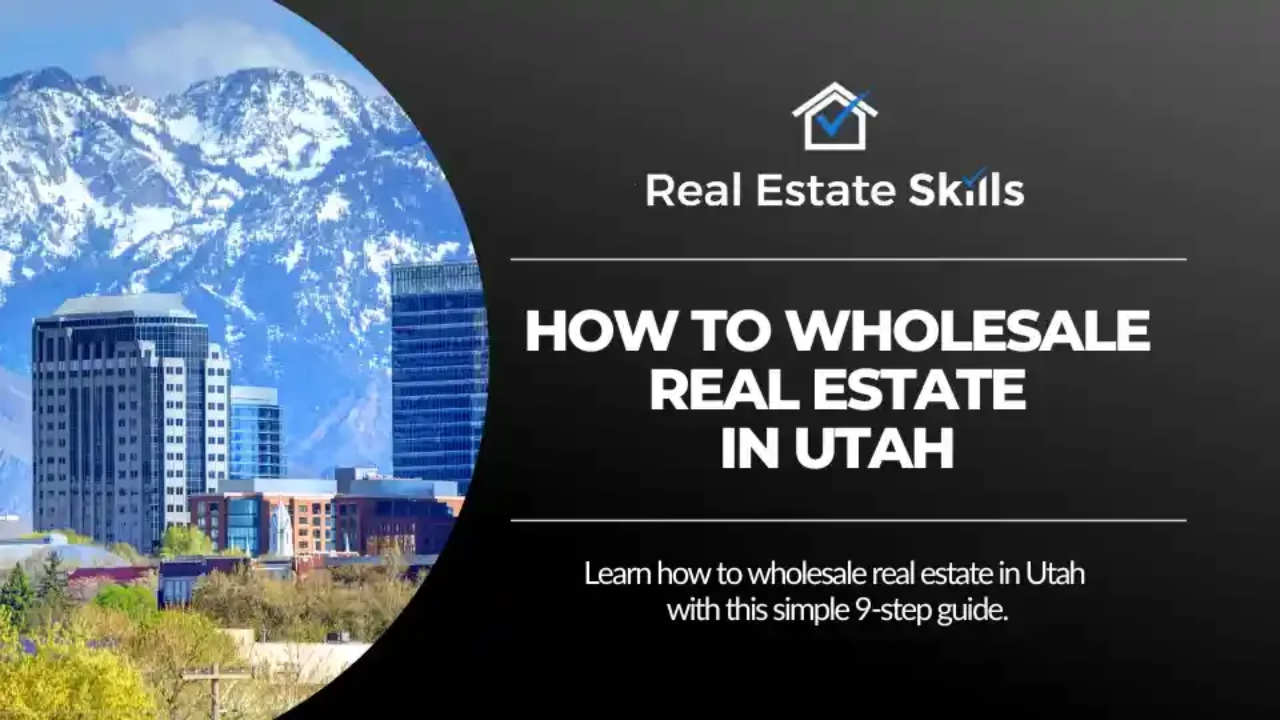
What: Wholesaling real estate in Utah involves finding undervalued properties, securing them under contract, and assigning that contract to an end buyer for a profit. It’s a low-capital entry point into real estate investing.
Why: Wholesaling can be a lucrative investment strategy because it allows you to profit from real estate without needing to buy, rehab, or finance properties. Utah’s growing housing market and strong buyer demand create consistent deal opportunities.
How: Learn how to wholesale real estate in Utah by following key steps in this article—understanding state wholesaling laws, finding motivated sellers, analyzing deals accurately, using proper contracts, and building a reliable cash buyer list to close deals quickly.
Wholesaling real estate is a popular strategy for beginners and those who want to learn more about the business. It's one of the few real estate investing strategies that allow you to earn large sums without actually purchasing property yet still gain first-hand experience in the field. As a result, it's a great way to start building connections and networking with other investors in your area.
With a population of over 3,380,800 and 1,228,746 units of housing, Utah is the ideal place to learn about wholesaling. Whether you live in Salt Lake City, St. George, or anywhere in between, you can find wholesale deals in your neighborhood. You just need to know what to look for and how to capitalize.
Here is a closer look at how to wholesale real estate in Utah and what you can do to get started:
- What Is Wholesaling Real Estate?
- How To Wholesale Real Estate In Utah (9 Steps)
- Is Wholesaling Houses Legal In Utah?
- How Much Do Real Estate Wholesalers Make In Utah?
- Do You Need A Real Estate License To Wholesale Real Estate In Utah?
- Is Wholesaling In Utah Easy?
- Final Thoughts On Wholesaling Real Estate In Utah
If you’re serious about doing your first real estate deal, don’t waste time guessing what works. Our FREE Training walks you through how to consistently find deals, flip houses, and build passive income—without expensive marketing or trial and error.
This FREE Training gives you the same system our students use to start fast and scale smart. Watch it today—so you can stop wondering and start closing.
*Take a look at the steps you will take to close your first wholesale deal in Utah in our in-depth video showing you how to wholesale real estate step by step, below:
What Is Wholesaling Real Estate?
Wholesaling is a real estate investing technique that involves finding deals on behalf of other real estate investors. House flippers and landlords are always on the lookout for new investment properties. However, it can often be stressful and time-consuming to locate off-market properties and negotiate with the owner to get a good price. Instead, they will often work with wholesalers who will take that burden off their shoulders.
roperty at that price. Then you will assign the contract over to the new buyer at a higher price and collect the difference as a fee. The new investor will purchase the property and finance any necessary renovations.
As a result, wholesaling allows you to earn substantial fees without purchasing a property, making it less risky than other investment strategies. However, it still takes a thorough understanding of the local market and a solid strategy to work effectively.
Read Also: How to Start Investing in Real Estate with No Money
Why Wholesale Real Estate In Utah?
Wholesaling real estate in Utah presents a promising opportunity for investors due to its strong housing market, with a median home value of $530,787, according to Zillow.
The state currently has 1,281 properties in foreclosure, 32 bank-owned properties, and 277 headed for auction, based on RealtyTrac data, offering a substantial inventory of distressed properties for wholesalers to target.
This mix of high property values and a healthy volume of motivated sellers makes Utah an attractive market for wholesalers aiming to secure profitable deals and build long-term success in a competitive yet rewarding environment.
How To Wholesale Real Estate In Utah (9 Steps)
Here's our simple step-by-step process for wholesaling real estate in Utah:
- Partner With A Wholesale Mentor
- Learn Utah Real Estate Wholesaling Laws & Contracts
- Understand The Utah Real Estate Market & Lingo
- Build A Cash Buyers List
- Find Motivated Sellers & Distressed Properties
- Put Distressed Properties Under Contract
- Assign The Contract To Cash Buyer
- Close Deal And Collect Assignment Fee
- Double Close Or Wholetail When Necessary
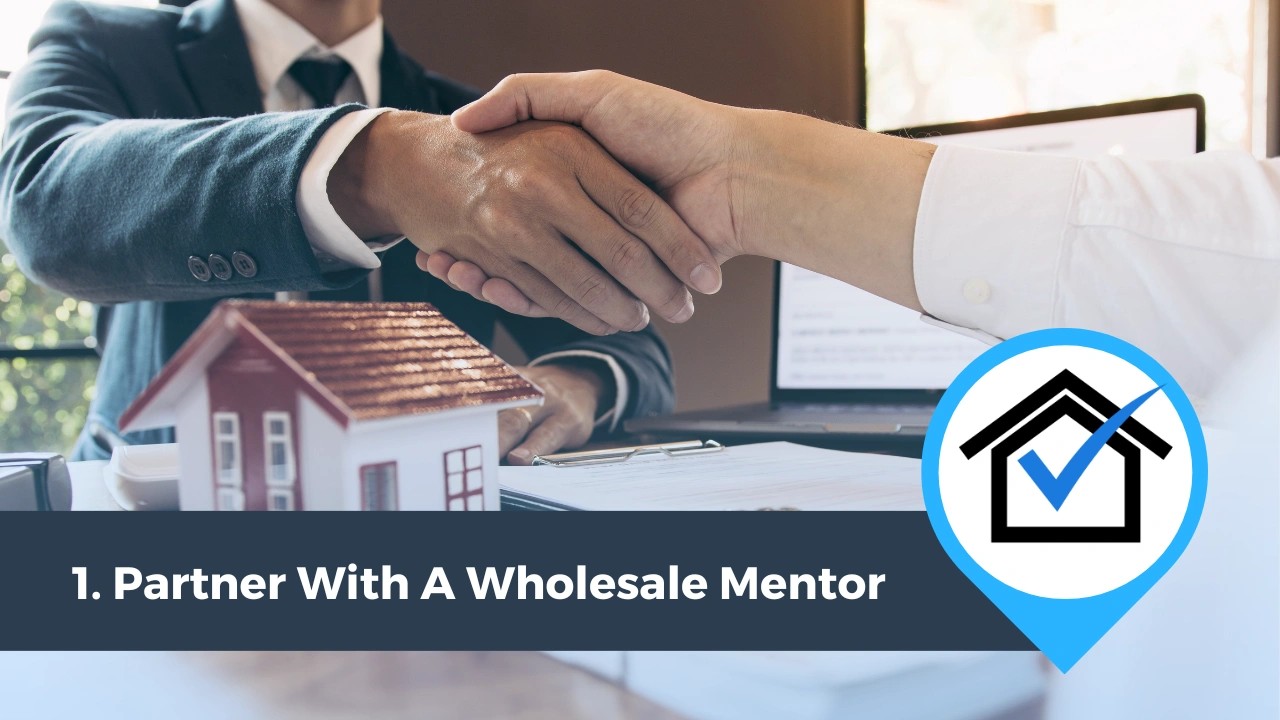
1. Partner With A Wholesale Mentor
Many beginners partner with a wholesale mentor to make the process more approachable. While a mentor isn't entirely necessary, it will help you avoid costly mistakes and start making money sooner. A mentor can show you the ropes and introduce you to people in their network who may benefit your wholesale real estate business.
So, if you want to avoid trial and error and start collecting fees as soon as possible, consider finding a mentor. You will find plenty of qualified candidates at local real estate conventions and events, through online courses and workshops, or on social media.
Read Also: Wholesale Real Estate Mentor: The ULTIMATE Beginner's Guide
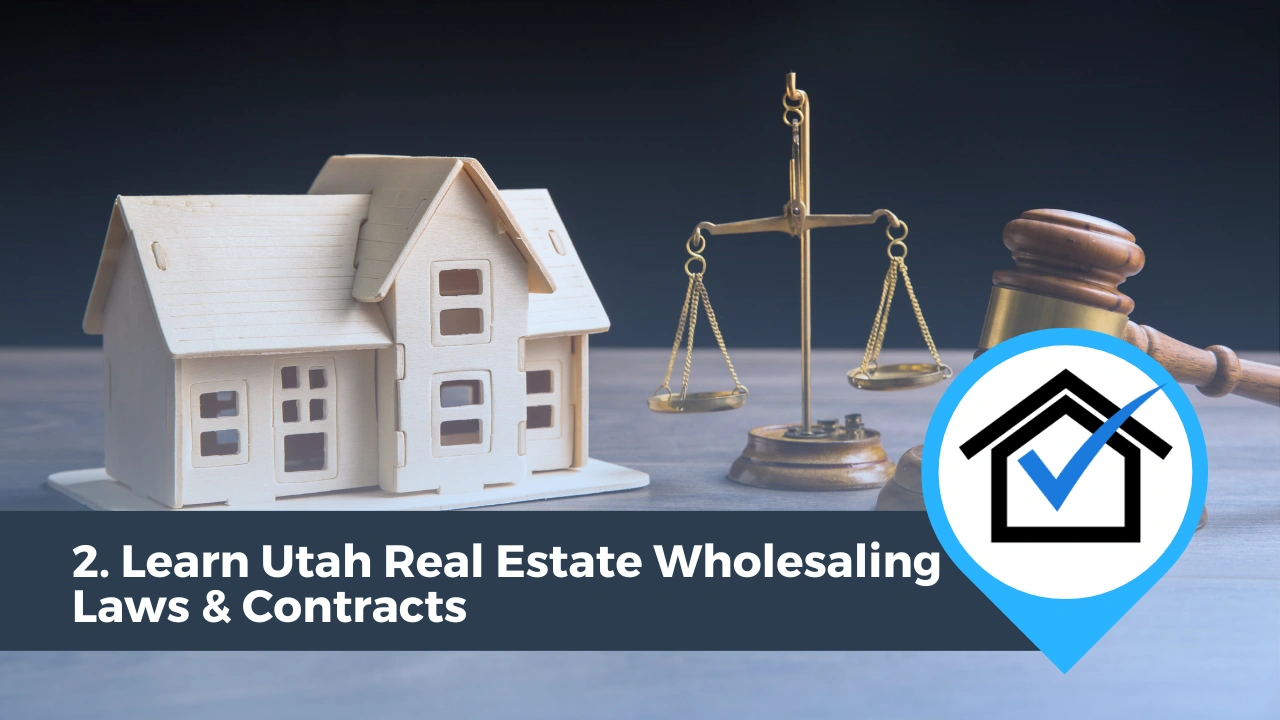
2. Learn Utah Real Estate Wholesaling Laws And Contracts
Before you begin scouting properties, you must do some preliminary research. Start by studying local real estate wholesaling laws and contracts. Wholesaling real estate is perfectly legal in Utah. However, certain behaviors are prohibited. For instance, you must avoid any activity requiring a real estate license if you are not a licensed real estate agent. Title 61 of the Utah General Code covers the legalities of buying and selling real estate and what activities require a license. So study these laws carefully to understand what you can and cannot do.
Also, familiarize yourself with the proper contracts used in wholesaling. As a wholesaler, you must get everything in writing if you want to get paid. So make sure you know which contracts to use and when.
The main contract you should be familiar with is the Real Estate Purchase Contract - the standard sale agreement used to confirm a buyer's right to purchase a property from a seller. You should also be sure to understand the assignment of interest addendum.
This is an example of a standard assignment of contract document that allows a buyer to assign an interest in a property to another person or entity. You will encounter both documents in your career as a wholesaler, so study them closely.
Read Also: Wholesale Real Estate Contracts: Download FREE PDF Templates
3. Understand The Utah Real Estate Market And Lingo
During your research phase, you should also study the Utah real estate market and vocabulary, so you're ready to get to work. Every market is different, and it's essential to understand the local housing prices to spot potential investment opportunities.
As a wholesaler, you will make money by identifying possible deals and convincing homeowners to sell to you at a specific price. So you must study the local housing market to identify real estate deals and set your prices. Study housing prices, demographic information, school districts, zoning laws, and anything else you think may be necessary.
Also, be sure to study the local real estate terminology, so you know what you're talking about and can have sophisticated conversations with investors. Understand terms like off-market, distressed properties, motivated sellers, market value, ARV, MAO, and more. You can find a basic list of important Utah real estate terms online. But if you really want to master the vocabulary, the National Association of Realtors (NAR) is a great resource.
Some of the largest chapters of the Utah NAR include:
- Salt Lake Board of Realtors
- Utah Central Association of Realtors
- Northern Wasatch Association of Realtors
- Brigham-Tremonton Board of Realtors
- Park City Board of Realtors
- Cache Valley Association of Realtors
These resources are absolutely critical for anyone learning how to wholesale real estate in Utah. With boots on the ground in every region, the data these associations provide is invaluable.
Read Also: Utah Real Estate Classes: Wholesaling, Flipping & Licensing
4. Build A Cash Buyers List
Once you feel confident in your understanding of local real estate laws, contracts and terminology, you're ready to start building a cash buyers list. Wholesaling houses is usually a quick process, so you'll want to have a list of potential cash buyers ready to contact before you begin scouting properties. The sellers you'll be dealing with will likely want a fast close, which means you won't have time to find a buyer after you get the property under contract.
So, you'll start by building a cash buyers list to reference when you find a deal. You'll want to look for flippers and investors actively looking to buy properties and have the funds available - either because they have cash in the bank or access to hard money loans.
You can also check out this video on how to find cash buyers!
When speaking with cash buyers, be sure to obtain the following information:
- Contact information (name, phone number, email, business address, etc.)
- What type of property they invest in (single-family, multi-family, commercial, etc.)
- How soon they're looking to make a purchase
- Any locations or markets they specialize in
- How are they financing the deal?
- Any other considerations
The more detailed you are with your list, the easier it will be when it comes time to find a buyer. Keep this information safe and organized in a spreadsheet, CRM, or other appropriate software.
Read Also: [FREE SCRIPT] How To Talk To Cash Buyers & Find Their Buying Criteria
5. Find Motivated Sellers And Distressed Properties
After you've built a decent cash buyer's list, it's time to look for wholesale properties. You'll want to learn how to identify distressed properties and motivated sellers because they make the best deals. A distressed property means the owner is in foreclosure (or about to be) and may also be behind on taxes, maintenance, etc. A motivated seller is a homeowner willing to sell their property at a discounted rate in exchange for a fast closing.
You can find distressed properties and motivated sellers in several different ways, including:
- Checking public records for foreclosures, bankruptcies, tax liens, divorces, etc.
- Send direct mailers to homes in your target area
- Post ads on Craigslist or Facebook Marketplace
- Post bandit signs that say "We Buy Houses."
- Check the probate courts
- Network with other real estate professionals (lenders, brokers, attorneys, contractors, etc.)
You may have to plant dozens or even hundreds of seeds to get a bite. But if you're persistent, you'll eventually find an interested homeowner.
Read Also: Finding Motivated Seller Leads: Free & Paid Tactics
6. Put Distressed Properties Under Contract
Congratulations, you've now found your first wholesale deal. But don't celebrate just yet. Now comes the trickiest part - getting the property under contract. Before you make an offer or sign any paperwork, you must crunch the numbers and ensure your offer is high enough that the seller will accept but low enough to attract investors.
To do so, you should familiarize yourself with two key terms - After Repair Value (ARV) and Maximum Allowable Offer (MAO).
Before you determine your MAO, let's look at how to lock in that property.
Watch this video to learn how to confidently fill out real estate contracts and secure your deal.
After-Repair-Value (ARV)
The after-repair value (ARV) refers to the price of the property when renovated to market standards. Distressed properties typically aren't in the best condition - the end buyer will need to put some money into renovations before selling or renting it to anyone else. So they will calculate the ARV to ensure it's a wise investment, which can help you determine your offer.
You can calculate an approximate after-repair value by finding the average price per square foot of homes for sale in the area and multiplying it by the square footage of your wholesale property. You can find the average price per square foot online or pull real estate comps to calculate it yourself. Comps are other comparable properties in the area that have recently been sold.
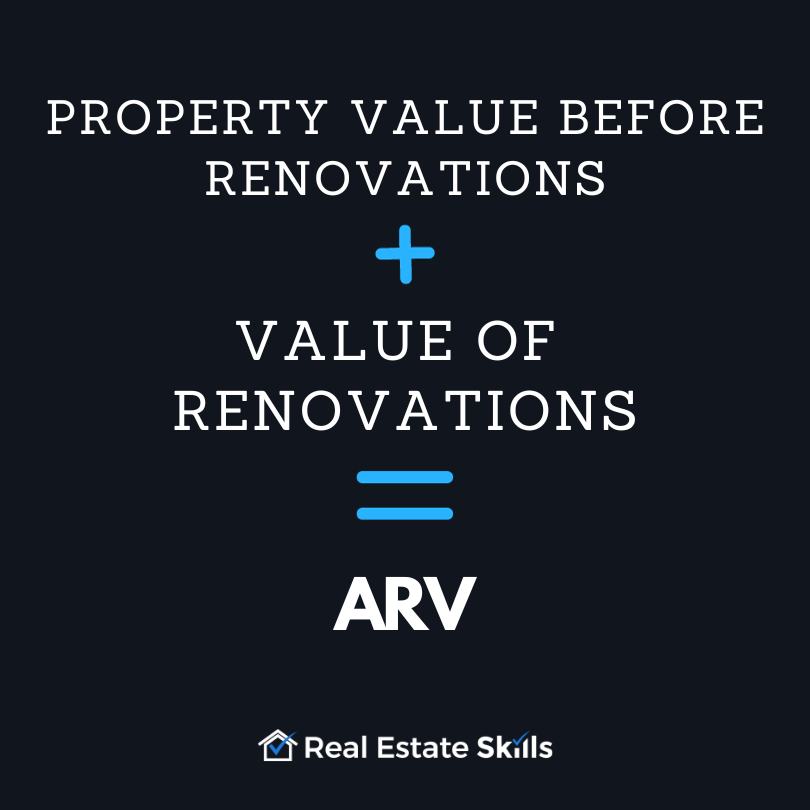
Find three to five properties that roughly fit the description of the property you're looking to wholesale, then divide the sales price by the square footage. Then take the average of all your comps and multiply that by the square footage of your wholesale property to determine a rough ARV.
You can either do this on your own or enlist the help of a real estate broker to make sure it's as accurate as possible. While you can find free information online, a broker will ensure that the data is more accurate, which may help in the long run.
Maximum Allowable Offer (MAO)
Once you've determined an ARV, you'll want to calculate your maximum allowable offer (MAO). The formula is:
MAO = ARV - Fixed costs - Rehab costs - Desired profit - Wholesale fee
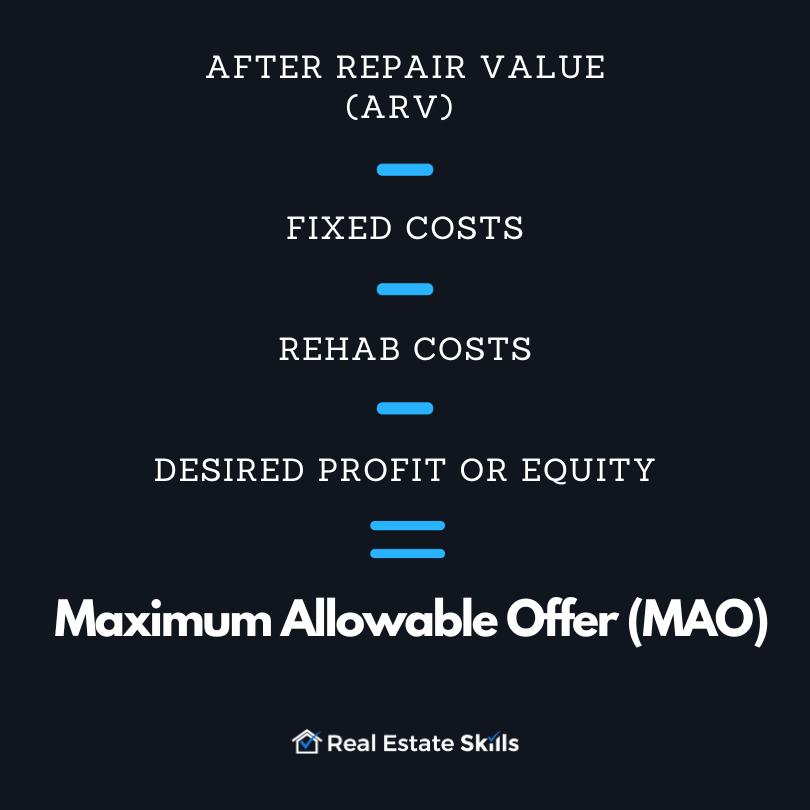
So you'll have to add up all the costs of owning and rehabbing the property and the desired profit margins and subtract it from the eventual sales price to determine a reasonable purchase price.
Fixed costs include taxes, insurance, utilities, loan interest, and other carrying costs the investor will pay while renovating the home. Rehab costs include the expenses related to renovating the property to market standards, and desired profit includes the margin the investor will want to make on the deal. Finally, don't forget to factor your own wholesale fee into the equation.
Again, you can do a quick calculation on your own or enlist the help of real state professionals to ensure the information is accurate. Many investors use the 70% rule, which means they look for anything lower than 70% of the after-repair value. This can be a good way to determine a ballpark estimate, although you may want to go more in-depth to ensure the numbers make sense.
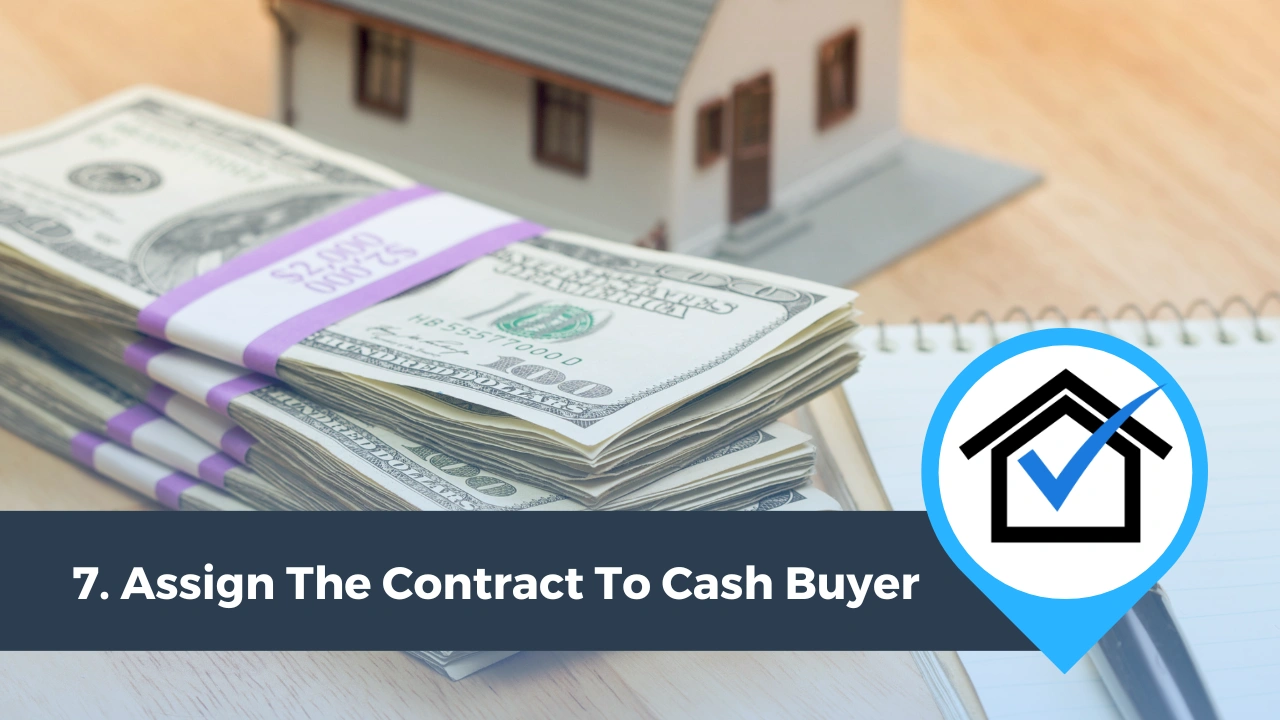
7. Assign The Contract To Cash Buyer
After you've crunched the numbers and the seller has accepted your offer, you'll want them to sign a wholesale real estate contract committing to the price.
You'll then start calling up people on your cash buyers list until you find an investor interested in your deal.
Once you find a potential candidate, you will assign the contract to them using the Utah assignment of interest addendum and finalize the deal.
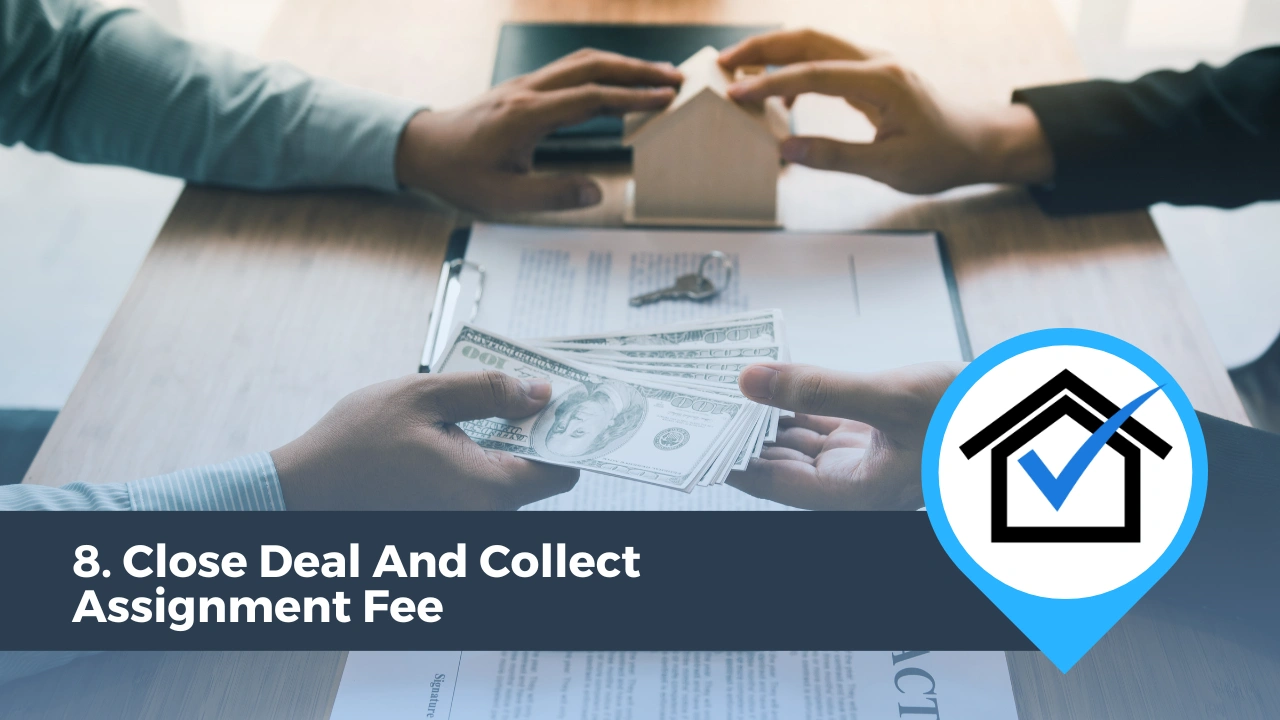
8. Close Deal And Collect Assignment Fee
Now you're in the home stretch. Once you and the buyer are on the same page, all that's left to do is close the sale and collect your assignment fee. The closing will typically be similar to any other real estate transaction.
The buyer and their attorney will look over the contract, and if everything looks good, they will sign on the dotted line.
The buyer will be responsible for supplying the necessary funds and paying any closing costs, so all you have to do is show up and collect your fee.
Your final payout will be the difference between the price you negotiated with the seller and the sale price paid by the buyer.
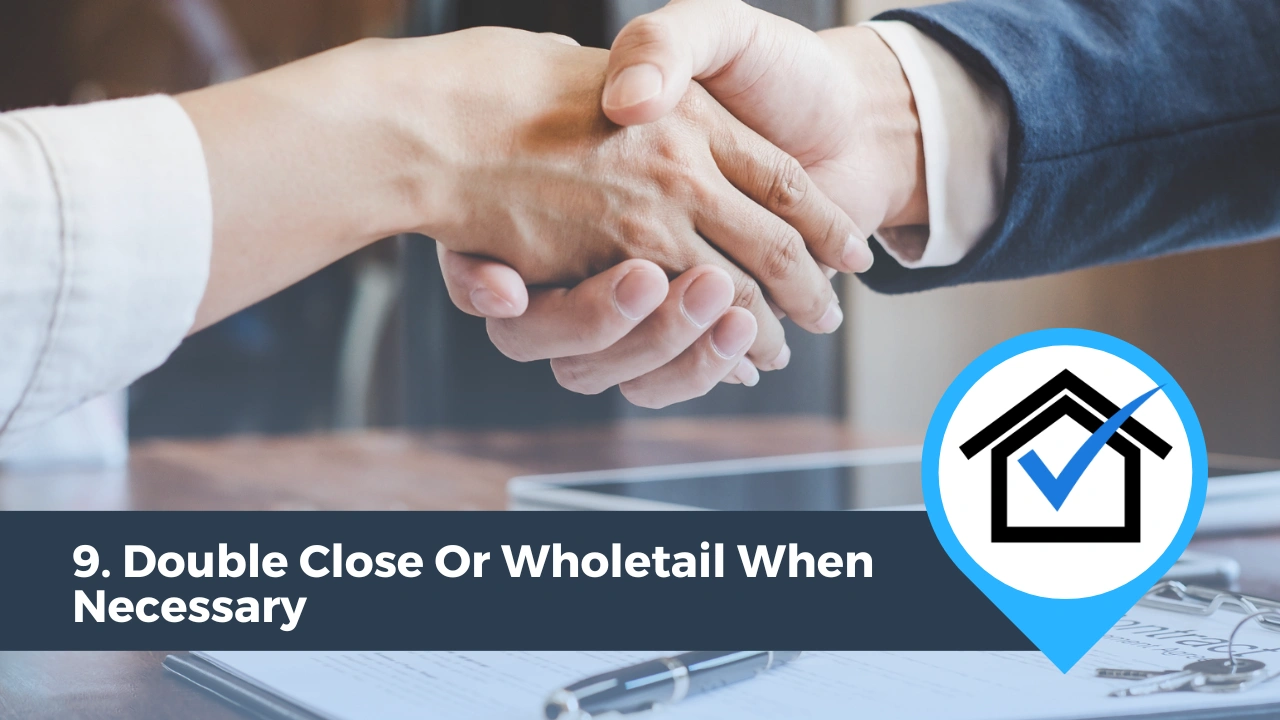
9. Double Close Or Wholetail When Necessary
Be aware that you may consider a few different exit strategies. Most beginners will likely go with a simple assignment because it's the most straightforward. But in certain instances, it may make sense to do a double close or wholetail.
As the name implies, a double closing is when you close twice on the property - once with the seller and once with the buyer. This may be required if the buyer is using a lender that has issues underwriting a traditional wholesale contract. If you structure it favorably, you won't be required to front any of the costs, but your name will appear on the chain of title, and you will technically take ownership for a short period. Most often, transactional funding is used to double close on a property.
Wholetailing is a strategy that's in between wholesaling and flipping houses. Wholetailers will also take ownership of a property for a short period and do some upgrades themselves. But the improvements are usually minor and cosmetic, not a full renovation. Wholetailing requires that you have the funds available to make a purchase but also offers higher profit margins than wholesaling. So you may consider this technique if you have the means.
Is Wholesaling Houses Legal In Utah?
Yes, wholesaling is legal in Utah as long as you stick to simply acting as a middleman in the transaction. You must avoid any activities requiring licensure and be sure that all of the contracts you use are valid and legally binding.
You may want to consult a real estate attorney if you have any questions about contracts or local laws regarding wholesaling. But as long as you understand your role and stick to the steps outlined in this guide, you shouldn't have any legal issues.
How Much Do Real Estate Wholesalers Make In Utah?
The beauty of wholesaling is that you can make as much or as little as you want. Some wholesalers work only on the weekends and use it to supplement their income, while others do it full-time and earn over six figures per year. The average wholesaler makes about $10,000 per deal but it all depends on your work ethic and negotiating skills.
Top wholesalers can make as much as $240,000 to $600,000 annually by closing 2-5 deals per month. While it may take some time to get to that level, the earning potential as a wholesaler is unlimited if you're willing to work.
Do You Need A Real Estate License To Wholesale Real Estate In Utah?
No, you don't need a real estate license to wholesale in Utah as long as you avoid providing any brokerage services. Brokerage services refer to representing another party in a real estate transaction in exchange for a fee.
Real estate agents offer various services to their clients, including marketing a property, negotiating, providing guidance and insight, and helping them through the closing. So try your best to stay neutral in the transaction and not represent anyone else's interests for compensation. Review Title 61 Chapter 2f of the Utah General Code to determine what behavior requires licensure.
Read Also: How To Wholesale With A Realtor: The (ULTIMATE) Guide
Is Wholesaling In Utah Easy?
It depends on your expectations. Wholesaling does take hard work, patience, and a willingness to learn, so in that sense, it's not a get-rich-quick scheme. But it is the easiest way to earn four to five-figure checks quickly without risking your life savings. You may consider hiring a mentor or enrolling in professional coaching like what we offer in the Real Estate Skills Pro Wholesaler VIP Program to make your journey even easier.
The Pro Wholesaler VIP Program is designed for the modern entrepreneur to learn the basics and how to help new real estate wholesalers avoid the pitfalls typically found by beginners. It is 100% online and is used for local and virtual real estate wholesaling.
Read Also: The Best Wholesale Real Estate Course (With Step-by-Step Training)
Final Thoughts On Wholesaling Real Estate In Utah
Wholesaling is a great way to learn about real estate investing and earn large checks. It's great for beginners because it doesn't require good credit or upfront capital, yet you have near-unlimited earning potential. But to be successful, you must study the real estate market and go through the steps to creating a sustainable business.
Check out our brand new free training on how we help investors all across the country wholesale and flip houses from the MLS using only a laptop and a cell phone!
If you’re serious about doing your first real estate deal, don’t waste time guessing what works. Our FREE Training walks you through how to consistently find deals, flip houses, and build passive income—without expensive marketing or trial and error.
This FREE Training gives you the same system our students use to start fast and scale smart. Watch it today—so you can stop wondering and start closing.
*Disclosure: Real Estate Skills is not a law firm, and the information contained here does not constitute legal advice. You should consult with an attorney before making any legal conclusions. The information presented here is educational in nature. All investments involve risks, and the past performance of an investment, industry, sector, and/or market does not guarantee future returns or results. Investors are responsible for any investment decision they make. Such decisions should be based on an evaluation of their financial situation, investment objectives, risk tolerance, and liquidity needs.

